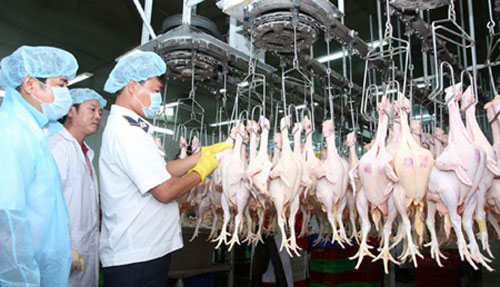|
Safety, quality key to
export growth
Ensuring food safety and security as well
as higher-quality products would enhance the sustainable development of
Thierry Rocaboy, an expert in the agribusiness and
agrifood industry, told seminar participants that the country's food
production for consumption had expanded greatly, with
However, he noted that export prices had remained low
due to the quality of products, and that food safety, especially herbs and
seafood products, were still of concern.
The value added to products was also low as materials
were not locally processed, he said, adding that less than 10 per cent of
coffee and 20 per cent of rubber were processed in
Marieke Van Der Pijl, vice chairwoman of the Food, Agri
and Aqua Business Sector Committee of Eurocham, said food safety was a key
issue as demand for higher standards had increased from both export and local
markets.
Further steps are needed to achieve efficient and
effective food safety control, and co-operation with neighbouring countries
should be enhanced to address cross-border food-safety issues.
Improved food-safety management and enforcement would
also help export growth, she said.
Also speaking at the seminar, Alain Cany, country
chairman of Jardine Matheson Viet
Another pressing concern mentioned at the seminar was
climate change. Arie Veldhuizen, agricultural counsellor at the Dutch Embassy
in Ha Noi, said the world population was forecast to reach nine billion by
2050, with climate change expected to undermine agriculture and food systems
in many regions, making it difficult to achieve food security.
Under such a scenario, it is necessary to create a
sustainable increase in agricultural productivity and resilient food systems.
"The key for
The country should focus more on restructuring the
agricultural sector to improve productivity, quality and efficiency, ensuring
sustainable food security while protecting the environment, he said, adding
that efficient co-operation among different stakeholders was also needed.
Delegates at the seminar said that costs and
post-harvest losses were too high, mainly due to weak logistics services.
Currently, 20 per cent of seafood, 25 per cent of fruit
and 30 per cent of vegetables produced in
Nguyen Tien Dinh at the Rural Development Centre under
the
To further develop the animal feed industry,
improvement must be made to small-scale and fragmented manufacturing,
ineffective supply chains with too many intermediaries, quality of animal
feed, and food safety.
Other seminar speakers mentioned the challenges in
agricultural mechanisation.
Farmers have not been using advanced mechanical methods
for several reasons: financial problems, a lack of understanding and
application of advanced technology, a lack of special expertise, and the use
of small and split fields, especially in northern and central regions.
Foreign investment
Despite robust growth of the agricultural sector and
Government incentives, foreign investment in the sector remains low compared
to other industries, accounting for about 0.5 per cent of total foreign
direct investment in the country.
Since the sector is heavily dependent on natural
conditions, it poses higher risks for investors. Inefficient, small-scale
dispersed production, and a shortage of infrastructure had contributed to
investment problems as well.
Seminar attendees urged the Government to develop clear
incentives and transparent policies, reduce licensing and land procedures and
costs, apply policies and regulations in a uniform way across regions, and focus
on protection of investors' rights.
In addition, authorities should consider ways of
promoting more public-private partnerships in the agricultural sector, they
said.
Luong Van Tu, chairman of the Viet Nam Coffee and Cocoa
Association, suggested that EU investors increase investment in processed
coffee and provide loans for replanting old coffee farms.
The seminar was organised by EuroCham, its Food Agri
Aqua Sector Committee and the EU Viet Nam Business Network.
Attendees included Government officials, public- and
private-sector practitioners, agribusiness leaders and researchers.
VNS
|
Thứ Tư, 22 tháng 10, 2014
Đăng ký:
Đăng Nhận xét (Atom)

Không có nhận xét nào:
Đăng nhận xét